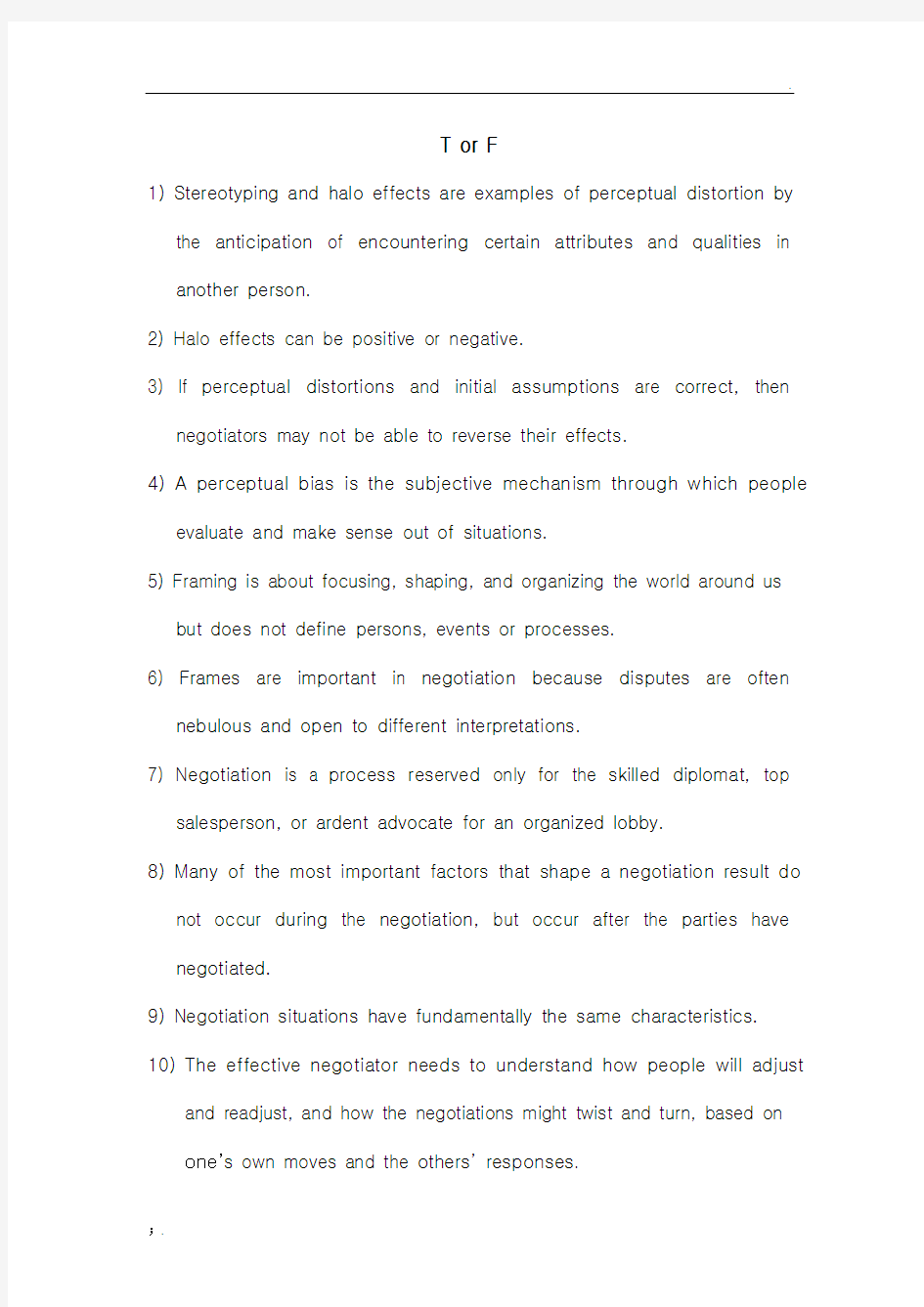

T or F
1) Stereotyping and halo effects are examples of perceptual distortion by
the anticipation of encountering certain attributes and qualities in another person.
2) Halo effects can be positive or negative.
3) If perceptual distortions and initial assumptions are correct, then
negotiators may not be able to reverse their effects.
4) A perceptual bias is the subjective mechanism through which people
evaluate and make sense out of situations.
5) Framing is about focusing, shaping, and organizing the world around us
but does not define persons, events or processes.
6) Frames are important in negotiation because disputes are often
nebulous and open to different interpretations.
7) Negotiation is a process reserved only for the skilled diplomat, top
salesperson, or ardent advocate for an organized lobby.
8) Many of the most important factors that shape a negotiation result do
not occur during the negotiation, but occur after the parties have negotiated.
9) Negotiation situations have fundamentally the same characteristics.
10) The effective negotiator needs to understand how people will adjust
and readjust, and how the negotiations might twist and turn, based on one’s own moves and the others’ responses.
11) The pattern of give-and-take in negotiation is a characteristic
exclusive to formal negotiations.
12) In contrast, non-zero-sum or integrative or mutual gains situations are
ones where many people can achieve their goals and objectives. 13) In integrative negotiation, the goals of the parties are mutually
exclusive.
14) The failure to reach integrative agreements is often linked to the failure
to exchange sufficient information that will allow the parties to identify integrative options.
15) Integrative agreements have been shown to be facilitated when parties
exchange information about their positions on particular issues, but not necessarily about their priorities on those issues.
16) If both parties understand the motivating factors for the other, they may
recognize possible compatibilities in interests that permit them to invent positions which both will endorse as an acceptable settlement.
17) Intrinsic relationship interests exist when the parties derive positive
benefits from the relationship and do not wish to endanger future benefits by souring it.
18) Focusing on interests allows parties to move beyond opening positions
and demands to determine what the parties really want-what needs truly must be satisfied.
19) The dominant force for success in negotiation is in the dialogue that
takes place prior to the planning.
20) A single planning process can be followed for both a distributive and an
integrative process.
BATNA
Best Alternative to a Negotiated Agreement.
Intangible factors
The underlying psychological motivations that may directly or indirectly influence the parties during a negotiation.
A joint goal
A joint goal is one that involves individuals with different personal goals agreeing to combine them in a collective effort.
Constituency
A constituency is one or more parties whose interests, demands, or priorities are being represented by the negotiator at the table.
Cognitive bases
Systematic errors made when processing information.
●What information do we need about the other party to prepare
effectively?
The other party’s current resources, interests, and bargaining mix.
The other party’s interests and needs.
The other party’s resistance point and alternative(s).
The other party’s targets and objectives.
The other party’s reputation and negotiation style.
The other party’s constituents, social structure and authority to make an agreement.
The other party’s likely strategy and tactics.
●Why should criteria be decided in advance of evaluating options?
If the parties first debate their criteria and determine which ones are most important, they will be able to decide on criteria independent of the consideration of any particular candidate or option. Then, when they consider the individual candidates or options, they will pick the best one based on these criteria, not on the individual preferences of one side or the other.
Describe the double-edged effect of overconfidence
1)Overconfidence can solidify the degree to which negotiators
support positions or options that are incorrect or inappropriate; and
2)Overconfidence can lead negotiators to discount the worth or
validity of the judgments of others, in effect shutting down other
parties as sources of information, interests, and options necessary
for a successful integrative negotiation.